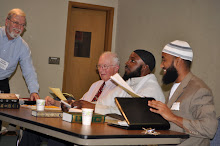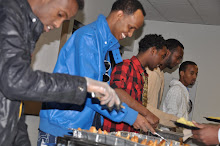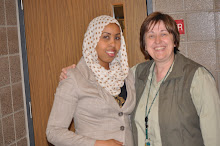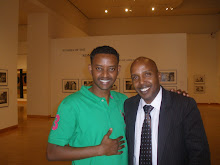By Britt Johnsen • bljohnsen@stcloudtimes.com • December 15, 2008
Mohamed Ismail was working close to 40 hours a week as a production worker in Clearwater. But the business cut its budget, reducing his work to about 25 hours per week.
He’s been looking for a job every day since that happened. He’s been praying and searching and waiting. And he has been talking with Mohamoud Mohamed, director of the St. Cloud Area Somali Salvation Organization.
People like Ismail may not be using advertisements or nonprofit groups as much as they are using Mohamed’s office in their job searches. His office on Wilson Avenue is a hub, a gathering place, for the Somali community. That’s where they find out about job openings and get support during hard times.
As a recession bleeds into the community, and more employers lay off workers or cut back hours, Mohamed sees how it is impacting the lives of many members of the Somali community.
It’s not that more people are coming in to Mohamed’s office. It’s what they’re talking about.
Before people even say hello to Mohamed in the morning, they ask him, “Do you have news for me?” They want to know if he knows about any jobs, Mohamed said.
But “we are not hearing good news,” he said.
Mohamed estimates that 1,500 Somali immigrants are unemployed.
He does what he can to help them. Some, though, have to move to other states. He’s helped find jobs for local Somali immigrants in places such as Lincoln, Neb. He’s also helped immigrants in St. Cloud find work in Hutchinson, Marshall and Little Falls.
Ismail is looking elsewhere for employment. Denver. California. Chicago.
But his family is here — his wife and his children, ages 9, 13 and 15. It would be tough to move them.
He is also thinking about becoming a taxi driver.
Few firms post hiring signs on the door. Still, he goes to companies and fills out applications. Visiting in person brings him a better chance at getting hired, so he can show he is interested and dedicated, he said. His best shot? When they say they’ll call if they have an opening, he said.
In the meantime, he’s done what his employer did: cut his budget.
And Ismail practices his Muslim faith. Mohamed explained that Muslims believe God, or Allah, writes people’s stories before they are born.
So Ismail, during his daily bread, is patient. He accepts the day ahead for what it brings. “You have to just adjust yourself to ... the situation,” he said, speaking through Mohamed as his interpreter.
“We appreciate it if we receive more. If we receive less, we thank God,” he said.
He expects this situation to continue for some time.
“It’s not going to change overnight,” Mohamed said. “I pray for our community.”
Subscribe to:
Post Comments (Atom)


















































No comments:
Post a Comment